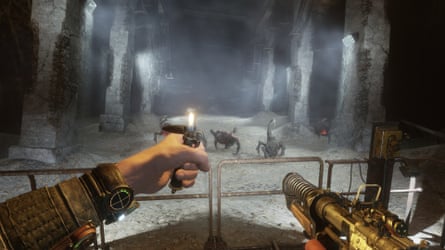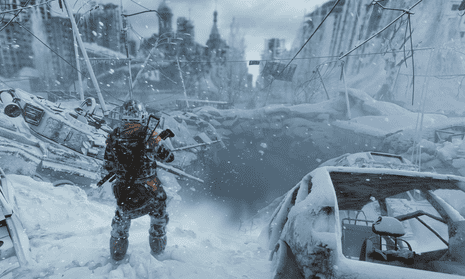Based on the novels by Dmitry Glukhovsky, Metro games have strived to define themselves by offering a more believable nuclear apocalypse, where you’re as likely to be killed by a crack in your gas mask or a pocket of radiation as you are by a gun-toting bandit or a terrifying mutant. Up to this point, that attention to detail has been mostly confined to the dark tunnels of the Moscow subway system, only fleetingly braving the irradiated and highly dangerous surface above.
With Metro Exodus, 4A Games expands the scope significantly, taking the player out of Moscow on a grand and perilous journey east. The result is a breathtaking and personal tale about the interplay between faith and survival.
The increased scale brings with it a greater amount of player freedom. While the story remains literally on rails, its tracks transport you far beyond the Moscow metro, stopping in several enormous, explorable locations. One of these sees you wading through the half-frozen marshlands around the Volga River, while in another you drive a battered camper van across the dried-out bed of the Caspian Sea.

This provides 4A’s meticulous environment designers with much larger canvas, and they paint a world stunning in its devastation. You can almost feel the chill in the air around the Volga as you explore abandoned trainyards and navigate a creaking rowboat through a half-submerged village. At one point, a storm loomed on the horizon like a wall of black smoke. It spent 20 minutes slowly scudding forward before finally assaulting me with lashing rain and gusting winds.
Meanwhile, the broader scope gives Metro’s survivalist shooting room to breathe, albeit through a gas mask. You’ll need to scour abandoned houses and dangerous lairs of mutants to find new weapons and equipment, while collecting resources to maintain your guns. The larger environments also enable more methodical combat: you can scout out bandit camps with binoculars before choosing whether to attack from a distance with long-range weapons, or eliminate enemies nonlethally via close-quarters stealth.
Metro Exodus’s narrative explores where and how people look for hope when the world has ended. It is hope that prompts the protagonist Artyom to look beyond the confines of the Moscow metro in the first place – and hope that keeps him going when a startling revelation makes their journey one way. As you journey through Russia in the steam train Aurora, you encounter various groups of people asking similar questions and finding all manner of answers.

On the icy shores of the Volga, a firebrand priest has convinced the locals to shun electrical equipment and pray to a monstrous catfish that lurks in the water. One of game’s best subplots occurs in the forests surrounding the river, where you discover an abandoned school in an overgrown village. Soon after, you encounter the missing children. Grownup and living a Robin Hood life in the forest, they make offerings to their deceased and deified Teacher, who protected them when society crumbled. Part Peter Pan, part Lord of the Flies, it is equally touching and tragic.
Given its novelistic source material, the Metro series has always had a strong narrative. But the focal point of the Aurora as a mobile home lets us get to know the game’s characters better. A drink and a chat with members of the expedition is as much a part of Exodus as a gunfight – perhaps too much so, as many conversations are overlong, and the script, clumsily labouring the same points, isn’t sharp enough to keep you engaged.
Particularly frustrating is the talismanic portrayal of Artyom’s wife, Anna, who is also the daughter of the expedition’s commander. The game is determined to put her in positions where one or both men need to save her, but Anna is a talented sniper who is initially your main companion. Exodus generally gives women a more prominent role than in previous games, and clearly wants players to invest in the relationship between Artyom and Anna. But this is undermined when it repeatedly makes her the object of the story rather than the person you work with to achieve the expedition’s goals.
As Exodus’ story draws to a close and the pace picks up, the world becomes narrower and more directed, and a final chapter takes players to the most dangerous Metro location yet. Here Exodus exposes you to the full horror of the apocalypse, as the experience takes on a surreal, otherworldly quality. It’s an excellent conclusion – haunting, frightening, and desperately sad. Yet even in this dead and desolate place, faint embers of hope still linger.
Metro Exodus is out February 15; £49.99

Comments (…)
Sign in or create your Guardian account to join the discussion